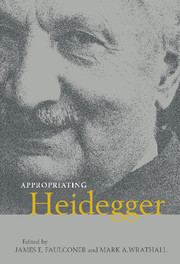Book contents
- Frontmatter
- Contents
- List of contributors
- Acknowledgments
- 1 Appropriating Heidegger
- PART 1 THINKING OUR AGE
- PART 2 HEIDEGGER IN CONTEXT
- 6 People of God, people of being: the theological presuppositions of Heidegger's path of thought
- 7 Heidegger for beginners
- 8 The critique of anthropologism in Heidegger's thought
- PART 3 READING BEING AND TIME
- Index
8 - The critique of anthropologism in Heidegger's thought
Published online by Cambridge University Press: 22 September 2009
- Frontmatter
- Contents
- List of contributors
- Acknowledgments
- 1 Appropriating Heidegger
- PART 1 THINKING OUR AGE
- PART 2 HEIDEGGER IN CONTEXT
- 6 People of God, people of being: the theological presuppositions of Heidegger's path of thought
- 7 Heidegger for beginners
- 8 The critique of anthropologism in Heidegger's thought
- PART 3 READING BEING AND TIME
- Index
Summary
Instead of seeing a new and extreme form of the modern subject in Heidegger's Dasein, as has been the case in some recent commentaries, I would like to show that his new approach to human being is made necessary by the attempt to rediscover the most original idea of philosophy, namely to take care of the All. This requires not only putting an emphasis on the ontological dimension of the existential analytic in Being and Time, but also showing the importance of Heidegger's debate with the Kantian “question of man” and with the Nietzschean ideal of the “superman.” Finally, from this perspective, we must also understand the necessity of the “reversal” that occurred in Heidegger's thinking in the thirties – a reversal that led to a new conception of the divine in the figure of the “extreme God” and of the world in the form of the fourfold of earth and sky, mortals and divinities.
In Germany, the end of the eighteenth century was marked by the development of the problematic of subjectivity on the basis of Kant's Copernican turn. It was a time when the young Schelling became the upholder of Fichtean egology and the propagator of the new principle of philosophy, the absolute I. Two hundred years later, at the end of the twentieth century, philosophy is no longer identified with egology, but with ethics, and its new principle (whose propagators are no longer German, but French) is the absolute Other.
- Type
- Chapter
- Information
- Appropriating Heidegger , pp. 119 - 134Publisher: Cambridge University PressPrint publication year: 2000
- 20
- Cited by



